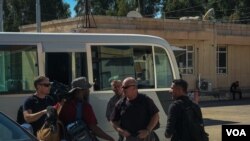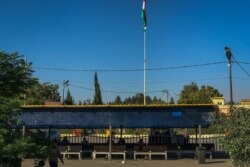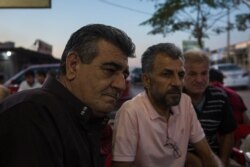Dozens of journalists stepped off white minibuses Monday that carried them out of Syria and into Iraq. Syrian government troops were coming, they said, and may be taking over the region.
"It's over," said one woman in camouflage trousers and boots. "We can't do our jobs."
Turkish assaults in the area had been brutal over the past few days, and reporters have been among the hundreds killed. But the press left mostly because they were traveling with permits from Kurdish authorities in what could possibly soon be Damascus-controlled areas. They did not want to risk arrest.
Sunday, the Syrian government and Kurdish authorities worked out a deal to counter Turkish assaults, but the details are still not clear about who is in charge and where. What is clear is that the deal included deployment of government troops in areas that have been controlled by Kurdish-led forces for years.
"The TV in the lobby was showing live footage of Syrian flags and cheering," said Alex Lourie, a journalist who evacuated Syria on Monday. "So, we got the hell out and stayed with our driver's brother."
Later that day, authorities from the regional Kurdish-led government were calling back the journalists, saying the agreement was "purely military" and "nothing could change that could put journalists and media professionals at risk."
Dynamic shifts
On state TV, the Syrian government announced it was controlling most of Syria's border with Turkey, and it had absorbed the main fighting force of the Syrian Democratic Forces into its ranks.
Turkey considers the SDF the same as the PKK — a militant group that has been attacking Turkey for decades. The SDF also spearheaded the U.S.-backed coalition against Islamic State militants, and was considered a key U.S. ally.
But last week, U.S. President Donald Trump announced he was pulling troops out of Syria, essentially clearing the way for Turkey to begin long-anticipated military operations against the SDF.
Now, it appears that if the Turkish military wants to attack the forces they see as a terrorist threat, they have to also attack the government of President Bashar al-Assad.
Since the U.S. announced it was pulling out troops last week, sparking the beginning of Turkish operations, 100,000 people have been displaced.
At a café near Dohuk, a Kurdish city not far from the border, refugees from previous conflicts in northeast Syria say they are angry that Turkey is bombing, and even angrier that the U.S. cleared a path for the bombs. But some people see the regime move as a stopgap that prevents the chaos of the past week from continuing.
"This was not a Kurdish decision," said Mohammad Saeed Shekhahmed, a 53-year-old Syrian refugee in Iraq, who was a baker before he fled his home in northeastern Syria in 2015. "But it was an enormous power bombing us. We had no choice but to become part of the regime."
Others see it as a massive loss for what was becoming an increasingly autonomous region.
"I am a refugee because of the regime," said Jumaa Dowd, a 60-year-old father of seven, who was a carpenter before he fled Syria. "Now, because of Trump, the Kurdish government has given the land back to the regime."







